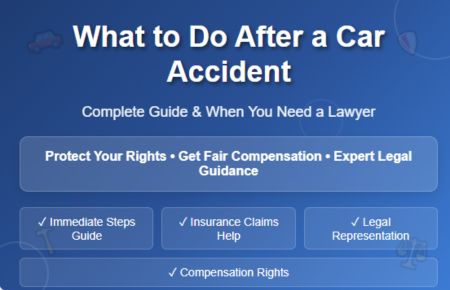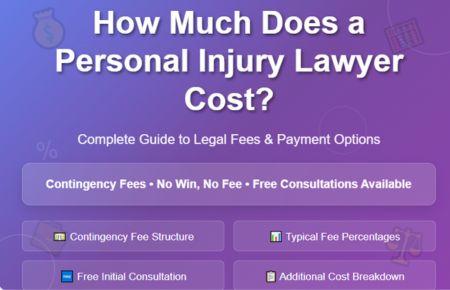Getting into a car accident is stressful enough without worrying about whether you’ll receive fair compensation for your injuries and damages. Unfortunately, many accident victims unknowingly make critical errors that can significantly reduce their settlement or even destroy their claim entirely. Understanding these common mistakes can mean the difference between receiving full compensation and walking away empty-handed.
If you’ve been injured in a motor vehicle accident, avoiding these five costly mistakes could save you thousands of dollars and ensure you get the justice you deserve.
1. Failing to Seek Immediate Medical Attention
The Mistake: Many accident victims feel “fine” immediately after a crash and decide to skip the emergency room or delay seeing a doctor. This is one of the most damaging mistakes you can make for your car accident claim.
Why It Destroys Your Claim: Insurance companies will argue that your injuries aren’t related to the accident if there’s a gap between the collision and your first medical treatment. Even a delay of just a few days can give insurers ammunition to deny your claim or significantly reduce your settlement.
The Hidden Danger: Adrenaline and shock can mask serious injuries like concussions, soft tissue damage, and internal bleeding. What seems like minor soreness today could develop into chronic pain, herniated discs, or traumatic brain injury symptoms within days or weeks.
What You Should Do Instead:
- Seek medical attention immediately, even if you feel fine
- Follow all doctor’s orders and attend every appointment
- Keep detailed records of all medical treatments, prescriptions, and recommendations
- Never skip physical therapy or follow-up appointments
Real Impact: Claims with immediate medical documentation average 40% higher settlements than those with delayed treatment, according to insurance industry data.
2. Giving a Recorded Statement to the Insurance Company
The Mistake: When the other driver’s insurance company calls asking for your version of events, many people think they’re being helpful by providing a detailed recorded statement. This is a trap that can destroy your claim.
Why It’s Dangerous: Insurance adjusters are trained professionals whose job is to minimize payouts. They’ll ask leading questions designed to get you to:
- Admit partial fault for the accident
- Downplay the severity of your injuries
- Contradict medical evidence or previous statements
- Provide information that can be taken out of context later
The Legal Reality: You are never required to give a recorded statement to the other driver’s insurance company. Your only obligation is to cooperate with your own insurance company as outlined in your policy.
What You Should Do Instead:
- Politely decline to give any recorded statements
- Refer all communication to your attorney if you have one
- Only provide basic facts in writing: date, time, location, and that an accident occurred
- Let your insurance company handle communications with the other insurer
Case Study: One client’s recorded statement, where they said they “didn’t see the other car coming” was used to argue they were 50% at fault, reducing their $100,000 claim to just $50,000.
3. Accepting the First Settlement Offer
The Mistake: Insurance companies often make quick, lowball settlement offers shortly after an accident, especially when injuries seem minor. Many victims accept these offers to avoid hassle and get quick cash.
Why This Destroys Your Claim: First offers are typically 10-20% of your claim’s true value. Once you accept and sign a release, you cannot reopen your case, even if your injuries worsen or you discover additional damages.
The Hidden Costs You’re Missing:
- Future medical expenses for ongoing treatment
- Lost wages from time off work for medical appointments
- Diminished earning capacity if injuries affect your ability to work
- Pain and suffering compensation
- Property damage beyond initial estimates
- Rental car expenses during repairs
What You Should Do Instead:
- Never accept the first offer
- Calculate all your current and future damages before negotiating
- Get a second medical opinion on the extent of your injuries
- Consult with a personal injury attorney to understand your claim’s true value
- Wait until you reach “maximum medical improvement” before settling
Financial Reality: First settlement offers average just 18% of final negotiated settlements, according to recent studies of personal injury claims.
4. Not Documenting the Accident Scene Properly
The Mistake: In the chaos following an accident, many people fail to gather crucial evidence or rely solely on police reports. Poor documentation can make it impossible to prove fault or the extent of damages.
Why Documentation Matters: Insurance disputes often hinge on whose version of events is more credible. Without proper evidence, it becomes your word against the other driver’s, and insurance companies will typically side with their own insured.
Critical Evidence You Need:
- Photos of all vehicle damage from multiple angles
- Wide-angle shots showing the accident scene, traffic signals, and road conditions
- Pictures of visible injuries, no matter how minor they appear
- Contact information for all witnesses
- The other driver’s insurance information and driver’s license
- License plate numbers of all vehicles involved
Advanced Documentation Tips:
- Take photos of the other driver’s insurance card, not just the policy number
- Record witness statements on your phone if possible
- Note weather conditions, time of day, and any road hazards
- Photograph street signs, traffic lights, and any relevant signage
- Get the responding officer’s name and badge number
What You Should Do Instead:
- Create a comprehensive accident file with all documentation
- Take new photos of your injuries as they develop
- Keep a daily journal of your pain levels and how injuries affect your life
- Save all receipts related to the accident (medical bills, rental cars, etc.)
5. Waiting Too Long to File Your Claim
The Mistake: Some accident victims wait weeks or months to contact insurance companies or hire attorneys, thinking they have plenty of time to deal with their claim later.
Why Timing Destroys Claims: Every state has a statute of limitations for personal injury claims, typically ranging from one to six years. However, insurance companies have much shorter deadlines for reporting accidents, usually 30-60 days.
The Immediate Consequences:
- Your insurance company may deny coverage for late reporting
- Witnesses become harder to locate, and their memories fade
- Evidence disappears (security footage is often deleted after 30 days)
- Medical records become less detailed as time passes
- Your credibility suffers when there are long delays
State-by-State Deadlines: While statutes of limitations vary, insurance policy deadlines are typically:
- Most insurers: 30 days to report the accident
- Some policies: 60 days maximum
- Failure to report: Complete denial of coverage possible
What You Should Do Instead:
- Report the accident to your insurance company within 24 hours
- Contact an attorney within the first week if you have significant injuries
- Begin gathering evidence immediately while it’s still available
- Start a paper trail documenting all communications and expenses
- Don’t wait for the other insurance company to contact you
How Much These Mistakes Actually Cost You
Recent analysis of car accident settlements reveals the financial impact of these common mistakes:
- No immediate medical care: 35-50% reduction in settlement value
- Recorded statements: 25-40% reduction due to admissions used against you
- Accepting first offers: 70-85% loss of potential compensation
- Poor documentation: 60% of disputed liability cases fail without proper evidence
- Late filing: 100% loss if deadlines are missed
Protecting Your Car Accident Claim: Action Steps
If you’ve been in a car accident, take these immediate steps to protect your claim:
Within 24 Hours:
- Seek medical attention, even for minor symptoms
- Report the accident to your insurance company
- Begin documenting your injuries and their impact on your daily life
- Preserve all evidence from the accident scene
Within One Week:
- Consult with a personal injury attorney for significant injuries
- Obtain copies of the police report
- Contact witnesses to get formal statements
- Start a comprehensive file with all accident-related documents
Ongoing Protection:
- Attend all medical appointments and follow treatment plans
- Keep detailed records of how injuries affect your work and personal life
- Never discuss your case on social media
- Decline to give recorded statements to other insurance companies
When to Hire a Personal Injury Attorney
While not every car accident requires an attorney, you should seriously consider legal representation if:
- You suffered serious injuries requiring ongoing medical treatment
- The other driver’s insurance company is disputing fault
- You’re being offered settlements that seem too low
- The insurance company is pressuring you to settle quickly
- You’re unable to work due to your injuries
- The other driver was uninsured or underinsured
The Attorney Advantage: Studies show that accident victims who hire attorneys receive settlements that are 3.5 times higher on average than those who handle claims themselves, even after legal fees are deducted.
Also Read:
What to Do After a Car Accident: A Complete Guide
When You Need a Personal Injury Lawyer After a Car Accident
Conclusion
Car accident claims are complex legal and financial matters that can impact your life for years to come. The five mistakes outlined above – failing to seek immediate medical care, giving recorded statements, accepting lowball offers, poor documentation, and delayed filing – can each cost you thousands of dollars or destroy your claim entirely.
The good news is that these mistakes are entirely preventable with the right knowledge and quick action. By understanding what insurance companies are looking for and protecting yourself from the beginning, you can maximize your chances of receiving fair compensation for your injuries and damages.
Remember, insurance companies are businesses focused on minimizing payouts, not ensuring you receive fair compensation. Protecting your interests requires vigilance, proper documentation, and often professional legal assistance.
Don’t let a moment of confusion or a desire to “be helpful” cost you the compensation you deserve. Your future financial security may depend on the decisions you make in the days and weeks following your accident.
Thank you for visiting our website mhnrc.org. If you liked the article, then share it with others.
If you’ve been injured in a car accident, time is critical. Contact an experienced personal injury attorney today to discuss your case and protect your rights. Most personal injury attorneys work on a contingency fee basis, meaning you pay nothing unless they recover compensation for you.


